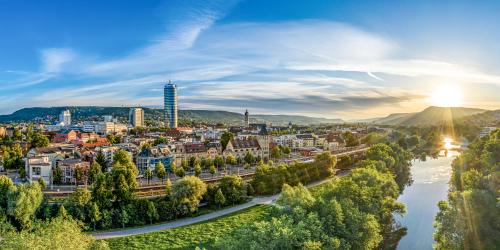
Municipal heat planning for Jena
At the latest since the start of the war of aggression on Ukraine, the issue of energy supply has dominated the nationwide media. With the Building Energy Act (BEG) now announced, new uncertainties are emerging and citizens and businesses are asking themselves how they should heat their premises in the future. Do heat pumps have to be installed or is it possible to get a connection to the district heating pipeline?
According to the current status of the GEG, such questions are to be clarified within the framework of a municipal heat planning. The city of Jena has already decided on such planning with its climate action plan, even though there is no legal obligation for this as yet. This means that Jena is already one step ahead of many other German municipalities. In June, an application for funding was submitted through the federal funding program Kommunalrichtlinie, which allows 90% funding for the preparation of a municipal heating plan. The city of Jena plans to complete the award procedure by the end of 2023 and to have the concept ready by the end of 2024.
The municipal heat planning is a strategic planning instrument of the municipality for the long-term design of the heat supply with the goal of climate neutrality. For this purpose, heat network areas and areas for decentralized heat supply are designated on the basis of an inventory and potential analysis with the aim of ensuring the most cost-efficient and climate-neutral supply possible. In the process, concrete measures and potentials are to be identified, and planning and investment security for citizens and companies is to be created.
"The heat transition is the most important lever of the energy transition and essential for achieving climate neutrality. Currently, about 60 percent of the country's energy consumption is allocated to the heating sector, in which natural gas and heating oil are predominantly used as energy sources. Municipal heat planning provides us with the necessary plan to meet the challenges of the energy transition and climate neutrality at the municipal level," says Christian Gerlitz, Mayor and Head of the Department of Urban Development.
Model project for integrated energy district concept (IEQW) launched
A model project in Jena shows what a heating plan can look like. The first energy concept in Jena is being developed for a neighborhood in the district of Wenigenjena. The neighborhood was selected because of its heterogeneity with regard to the large number of owners and the differentiated building structure and is not subject to the district heating statutes. Due to the small scale of the building structures, networked supplies (local heating networks) must therefore be developed across owners.
By means of an IEQW, the technical and economic energy saving potentials in the neighborhood are to be identified, taking into account housing, urban development, building culture, demographic and social aspects, and short-, medium- and long-term possibilities for reducing greenhouse gas emissions and increasing energy efficiency are to be defined so that the targeted reduction of CO2 emissions by 80 to 95 percent by 2050 compared to 1990 can be achieved.
A survey of owners and tenants in the neighborhood is already underway using a questionnaire, followed by a public event in September 2023 to provide information on the initial results. In 2024, the integrated energy district concept for Wenigenjena will be drawn up.
